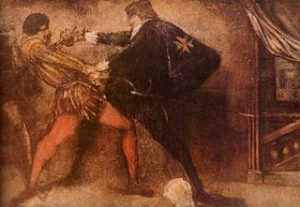 How many times has a discussion escalated into an argument, or an argument into violence, with the hurling of insults? It seems we human beings never outgrow the impulse to call people who disagree with us nasty names. There have been enough compilations of creative, gleeful, or historical insults to fill entire libraries. We so much enjoy our own cleverness that we blithely ignore whether calling someone names actually encourages them to change their behavior or whether it firmly cements their own negative opinion of us and their determination to not do whatever it is we want. The words we use and the comparisons we make say as much about us as about those we are insulting. The same is true for characters in fiction.
How many times has a discussion escalated into an argument, or an argument into violence, with the hurling of insults? It seems we human beings never outgrow the impulse to call people who disagree with us nasty names. There have been enough compilations of creative, gleeful, or historical insults to fill entire libraries. We so much enjoy our own cleverness that we blithely ignore whether calling someone names actually encourages them to change their behavior or whether it firmly cements their own negative opinion of us and their determination to not do whatever it is we want. The words we use and the comparisons we make say as much about us as about those we are insulting. The same is true for characters in fiction.
Let’s accept as given that the purpose of insults is not reconciliation. If that were true, we’d have long since achieved peace in the Middle East, not to mention a few dozen other places around the globe. What are the other possibilities?
- Venting ill temper, including displaced aggression – that’s the man who kicks his dog instead of his boss, the real target of his anger.
- Showing off for a third party.
- Parroting what has been said by those the character respects.
- Being out of control. If violence is the last refuge of the incompetent, then surely hurling insults is an expression of frustration in a person who simply can’t come up with a constructive response.
- Trying to provoke a reaction, whether it’s loss of control in the other character or an escalation of violence.
- Justifying previous ill-treatment of the person being insulted.
Some of these motives are deliberate, calculated to evoke a specific response, but others are just the opposite. Assuming a character knows what he’s doing and does it on purpose, how invested is he in the result? He might get what he wants, but he might not. One of those two overgrown schoolboys taunting one another might turn the other cheek. Or might laugh in his face. What does your character do then?
The parallel to this is how a character reacts when she realizes she’s crossed a line, that she’s out of control, and that to large extent depends upon how self-aware she is. Some people are so embarrassed, they escalate hostilities, trying to get the other person’s response to justify their own lapse in judgment. Others will back off if given the opportunity, for instance if a third party steps in and lowers the tension. A character could realize what he’s done, lack the skills to remedy the situation, participate in whatever bad things happen next, and carry away a secret feeling of guilt for the outcome.
Then there’s the particularly (and often deliciously) odious character who is in perfect control of himself and hurls insults deliberately. The cruelty has a purpose, and if the character is challenged on his own behavior, he justifies it as being in the best interests of the person being insulted. “For your own good,” “to toughen you up,” that sort of thing.
Sometimes insults are a form of betrayal. Is this deliberate or unconscious? Heated words inflicted on a friend or loved one in the moment, without reflection on the hurt they cause? Even if the hurt is verbally forgiven, do the effects of a moment of ill-considered pique change the relationship? And how might the resulting resentment and guilt play out over time?
Now to flip the mirror and look at the character being insulted, who really is the person with the power in this situation. She has the greatest degree of freedom in her actions, whether to respond in kind or in some other way; whether to walk away, whether to draw out the suspense of the encounter; whether to end the exchange for good or let it fester – or encourage that festering. What is his history in the relationship and will he use the insult to settle an old score or will he refuse to take it personally – and why?
Therein lies a tale or twenty…
